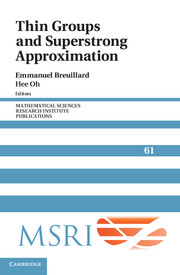Book contents
- Frontmatter
- Contents
- Preface
- Some Diophantine applications of the theory of group expansion
- A brief introduction to approximate groups
- Superstrong approximation for monodromy groups
- The ubiquity of thin groups
- The orbital circle method
- Sieves in discrete groups, especially sparse
- How random are word maps?
- Constructing thin groups
- Ergodic properties of the Burger–Roblin measure
- Harmonic analysis, ergodic theory and counting for thin groups
- Generic elements in Zariski-dense subgroups and isospectral locally symmetric spaces
- Growth in linear groups
- Strong approximation for algebraic groups
- Generic phenomena in groups: some answers and many questions
- Affine sieve and expanders
- Notes on thin matrix groups
Sieves in discrete groups, especially sparse
Published online by Cambridge University Press: 29 May 2025
- Frontmatter
- Contents
- Preface
- Some Diophantine applications of the theory of group expansion
- A brief introduction to approximate groups
- Superstrong approximation for monodromy groups
- The ubiquity of thin groups
- The orbital circle method
- Sieves in discrete groups, especially sparse
- How random are word maps?
- Constructing thin groups
- Ergodic properties of the Burger–Roblin measure
- Harmonic analysis, ergodic theory and counting for thin groups
- Generic elements in Zariski-dense subgroups and isospectral locally symmetric spaces
- Growth in linear groups
- Strong approximation for algebraic groups
- Generic phenomena in groups: some answers and many questions
- Affine sieve and expanders
- Notes on thin matrix groups
Summary
We survey the recent applications and developments of sieve methods related to discrete groups, especially in the case of infinite index subgroups of arithmetic groups.
Sieve methods appeared in number theory as a tool to try to understand the additive properties of prime numbers, and then evolved over the twentieth century into very sophisticated tools. Not only did they provide extremely strong results concerning the problems most directly relevant to their origin (such as Goldbach’s conjecture, the twin primes conjecture, or the problemof the existence of infinitely many primes of the form n2+1). but they also became tools of crucial important in the solution of many problems which were not so obviously related (examples are the first proof of the Erdős–Kac theorem, and more recently sieve appeared in the progress, and solution, of the quantum unique ergodicity conjecture of Rudnick and Sarnak).
It is only quite recently that sieve methods have been applied to new problems, often obviously related to the historical roots of sieve, which involve complicated infinite discrete groups (of exponential growth) as basic substrate instead of the usual integers. Moreover, both “small” and “large” sieves turn out to be applicable in this context to a wide variety of very appealing questions, some of which are rather surprising. We will attempt to present this story in this survey.
Information
- Type
- Chapter
- Information
- Thin Groups and Superstrong Approximation , pp. 107 - 140Publisher: Cambridge University PressPrint publication year: 2014
